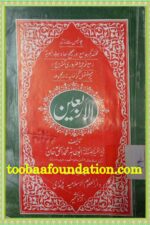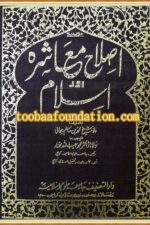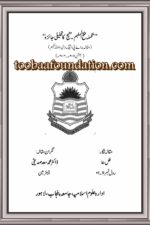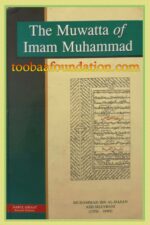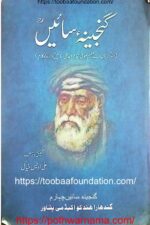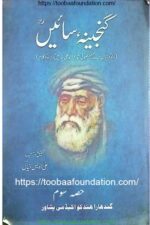-
AL-ARBAEEN (40 HADITHS) BY: MAULANA ISHAAQ SAHIB
الاربعین
(مجموعہ احادیث)
از: مولانا محمد اسحٰق صاحب
AL-ARBAEEN
(40 HADITHS)
BY: MAULANA ISHAAQ SAHIB
……………………………………………………………………………………….
مختارات حکیم من کلام سید المرسلینﷺ
اربعین احادیث مع شرح
مئولفہ : مولانا حکیم عبدالقدوس مہاجر مدنیؒ
۔۔۔۔۔۔۔۔۔۔۔۔۔۔۔۔۔۔۔۔۔
اربعین من احادیث سید المرسلینﷺ
مرتبہ : شمس العلماء مولوی سید ممتاز علی
پیشکش : طوبیٰ ریسرچ لائبریری
۔۔۔۔۔۔۔۔۔۔۔۔۔۔۔۔۔۔
مع عربی متن و شرح اردو
اربعین عربی : امام ابو زکریا محی الدین النوویؒ
مترجم و شارح اردو : مفتی محمد عاشق الہی المدنی ؒ
۔۔۔۔۔۔۔۔۔۔۔۔۔۔۔۔۔
امام شاہ ولی اللہ محدث دہلویؒ
بروایت : حضرت علی کرم اللہ وجہہ
ترجمہ : علامہ ڈاکٹر عبدالحلیم چشتی ؒ
تہذیبِ جدید تشریح : مولانا عبدالماجد دریابادی ؒ
۔۔۔۔۔۔۔۔۔۔۔۔۔۔۔۔۔۔۔۔۔۔۔۔۔۔۔
تالیف : فضیلۃ الشیخ عبداللہ دانشؒ
ترتیب و تخریج : میاں طاہر
پیشکش : طوبیٰ ریسرچ لائبریری
۔۔۔۔۔۔۔۔۔۔۔۔۔۔
-
ISLAH E MAASHARAH
اصلاح معاشرہ
(صحیح بخاری و صحیح مسلم کی متفق علیہ 100 احادیث کی تشریح)
اردو ترجمہ : مولانا ڈاکٹر حبیب اللہ مختار
شرح مائة حديث مختارة مما اتفق عليه البخاري ومسلم
المؤلف : محمد بن سالم بن حسين الكدادى البيحانى
ISLAH E MAASHARAH
(1OO AHADITHS OF SAHIH BUKHARI + SAHIH MUSLIM )
URDU TRANSLATION BY : Moulana Dr. Habib Ullah Mukhtar
DOWNLOAD:133MB
-
Mufti Muhammad Taqi Usmani ki taleef Takmila -e-Fath al-Mulhim ka Manhaj aur Usloob: tahqiqi wa tajziyati mutala
مفتی محمد تقی عثمانی کی تالیف تکملہ فتح الملھم کا منہج واسلوب :تحقیقی وتجزیاتی مطالعہ
(تحقیقی مقالہ برائے پی ایچ ڈی علوم اسلامیہ)
مقالہ نگار : نثار احمد ریاض
نگران مقالہ: ڈاکٹر مسززریں ایس ۔
معاون نگران مقالہ: ڈاکٹر محمد فیروزالدین شاه کھگہ
صدرشعبہ علوم اسلامیہ و عربی،
یونیورسٹی آف سرگودها،سرگودها
سیشن (2010-2013ء)
Mufti Muhammad Taqi Usmani ki taleef Takmila -e-Fath al-Mulhim ka Manhaj aur Usloob: tahqiqi wa tajziyati mutala
(Ph.D. Thesis Islamiyat)
maqala nigar: Nisar Ahmed Riaz.
مزید مطالعہ کے لیئے دیکھیئے
تکملہ فتح الملہم – منہج کا تحلیلی جائزہ
(تحقیقی مقالہ برائے پی ایچ ڈی علوم اسلامیہ)
مقالہ نگار :ظل ہما
۔۔۔۔۔۔۔۔۔۔۔۔۔۔۔۔۔۔۔
تکملہ فتح الملھم شرح صحیح مسلم میں مفتی محمد تقی عثمانی کی تر جیحی آراء کا تجزیاتی مطالعہ
ڈاکٹرعبداللہ خان۔ڈاکٹر سید ازکیا ہاشمی
۔۔۔۔۔۔۔۔۔۔۔۔۔۔۔۔۔
-
Mufti Muhammad Taqi Usmani ki taleef Takmila -e-Fath al-Mulhim ka Manhaj aur Usloob: tahqiqi wa tajziyati mutala – Copy
مفتی محمد تقی عثمانی کی تالیف تکملہ فتح الملھم کا منہج واسلوب :تحقیقی وتجزیاتی مطالعہ
(تحقیقی مقالہ برائے پی ایچ ڈی علوم اسلامیہ)
مقالہ نگار : نثار احمد ریاض
نگران مقالہ: ڈاکٹر مسززریں ایس ۔
معاون نگران مقالہ: ڈاکٹر محمد فیروزالدین شاه کھگہ
صدرشعبہ علوم اسلامیہ و عربی،
یونیورسٹی آف سرگودها،سرگودها
سیشن (2010-2013ء)
Mufti Muhammad Taqi Usmani ki taleef Takmila -e-Fath al-Mulhim ka Manhaj aur Usloob: tahqiqi wa tajziyati mutala
(Ph.D. Thesis Islamiyat)
maqala nigar: Nisar Ahmed Riaz.
مزید مطالعہ کے لیئے دیکھیئے
تکملہ فتح الملہم – منہج کا تحلیلی جائزہ
(تحقیقی مقالہ برائے پی ایچ ڈی علوم اسلامیہ)
مقالہ نگار :ظل ہما
۔۔۔۔۔۔۔۔۔۔۔۔۔۔۔۔۔۔۔
تکملہ فتح الملھم شرح صحیح مسلم میں مفتی محمد تقی عثمانی کی تر جیحی آراء کا تجزیاتی مطالعہ
ڈاکٹرعبداللہ خان۔ڈاکٹر سید ازکیا ہاشمی
۔۔۔۔۔۔۔۔۔۔۔۔۔۔۔۔۔
DOWNLOAD
-
Takmila Fath al-Mulhim – Manhaj ka Tahlili Jaiza
تکملہ فتح الملہم – منہج کا تحلیلی جائزہ
(تکملہ فتح الملہم از : شیخ الاسلام حضرت مفتی تقی عثمانی )
(مقالہ برائے پی ایچ۔ ڈی، اولڈ سکیم )
( سیشن ۲۰۱۱ء۔۲۰۱۶ء)
مقالہ نگار :ظل ہما
نگران مقاله: ڈاکٹر محمد سعد صدیقی
چیئرمین
ادارہ علوم اسلامیہ، جامعہ پنجاب، لاہورTakmila Fath al-Mulhim – Manhaj ka Tahlili Jaiza
) “Takmila Fath al-Mulhim” az: Shaykh al-Islam Hazrat Mufti Taqi Usmani(
(Phd Thesis)
Maqala Nigar: Zill-e-Huma
Nigran Maqala: Dr. Muhammad Saad Siddiqi
-
The Muwatta of Imam Muhammad (ENGLISH)
Imam Malik ibn Anas and Imam Muhammad ibn al-Hasan. This topic is of particular interest to students of hadith, as it relates to the transmission and narration of the Muwatta, a significant collection of hadith and legal rulings. Let’s break down the topic step by step:
- Imam Malik ibn Anas: Imam Malik (711-795 CE) was a prominent Islamic scholar and jurist who lived in Medina, one of the holiest cities in Islam. He is best known for compiling the “Muwatta,” which is a collection of hadith and legal rulings. Imam Malik’s deep knowledge of Islamic traditions, his reputation for integrity, and his proximity to the place where the Prophet Muhammad lived and taught gave his collection a special significance.
- The Muwatta: The “Muwatta” is a compilation of hadith and legal rulings organized by Imam Malik. It covers a wide range of topics related to Islamic law, ethics, social matters, and more. The Muwatta is highly regarded for its authenticity and is considered one of the earliest and most comprehensive collections of its kind.
- Imam Muhammad ibn al-Hasan: Imam Muhammad (also known as Muhammad al-Shaybani) was a distinguished student of Imam Abu Hanifa and a close companion of Imam Malik. He was also a scholar of Islamic jurisprudence and played a significant role in transmitting the teachings of his teachers.
- Narration of Imam Muhammad ibn al-Hasan: Imam Muhammad ibn al-Hasan narrated the Muwatta of Imam Malik. This means that he learned the hadith and legal rulings directly from Imam Malik and then transmitted them to others. Narrators like Imam Muhammad are crucial in preserving the authenticity of the hadith collection and ensuring that it is accurately transmitted from one generation to another.
In summary, the topic of “The Muwatta of Imam Malik ibn Anas in the narration of Imam Muhammad ibn al-Hasan” refers to the process of how Imam Muhammad ibn al-Hasan, a student of Imam Malik, learned and transmitted the Muwatta collection. This transmission helps maintain the accuracy and authenticity of the collection, making it a reliable source of guidance for students of hadith, scholars, and anyone seeking a deeper understanding of Islamic law and teachings.
The Muwatta of Imam Muhammad is an important and influential collection of hadith (sayings, actions, and approvals of the Prophet Muhammad) and legal rulings in Islamic jurisprudence (fiqh). It holds a significant place in Islamic scholarship and is highly regarded by scholars, jurists, and students of Islam.
Here are some key points that describe the importance of the Muwatta of Imam Muhammad:
- Authenticity: The Muwatta is considered one of the most authentic collections of hadith and legal traditions. Imam Muhammad ibn Hasan al-Shaybani, the author of the Muwatta, was a prominent disciple of Imam Abu Hanifa, one of the founders of the Hanafi school of Islamic jurisprudence. The hadith and legal rulings included in the Muwatta are meticulously selected for their authenticity, which adds to its credibility among scholars.
- Comprehensive Content: The Muwatta covers a wide range of topics, including rituals, ethics, social matters, family law, business transactions, and more. It provides a comprehensive overview of various aspects of Islamic life and jurisprudence, making it a valuable resource for understanding Islamic teachings and practices.
- Simplicity and Accessibility: One of the notable features of the Muwatta is its simplicity and straightforwardness. Imam Muhammad intentionally structured the collection in a way that makes it easy to understand and apply. This accessibility has contributed to its widespread use among scholars and students alike.
- Influence on Jurisprudence: The Muwatta played a crucial role in shaping the Hanafi school of jurisprudence and contributed to the development of Islamic legal thought in general. The hadith and legal opinions in the Muwatta served as foundational sources for deriving legal rulings and principles within the Hanafi tradition.
- Cross-Tradition Appeal: While Imam Muhammad was a follower of the Hanafi school, his Muwatta gained recognition beyond the Hanafi tradition. Scholars from other Islamic jurisprudential schools also appreciate the collection for its valuable insights into early Islamic legal and social practices.
- Historical Insight: The Muwatta provides a glimpse into the social, cultural, and legal dynamics of early Islamic society. It offers historical context for various legal rulings and practices, contributing to a better understanding of the development of Islamic law and the challenges faced by the Muslim community during that era.
- Preservation of Tradition: The Muwatta is an example of the efforts made by early Islamic scholars to preserve and transmit the teachings of the Prophet Muhammad and his companions accurately. It serves as a bridge connecting later generations with the practices and wisdom of the earliest Muslims.
In summary, the Muwatta of Imam Muhammad holds immense importance due to its authenticity, comprehensive content, influence on jurisprudence, accessibility, cross-tradition appeal, historical insights, and role in preserving Islamic tradition. It continues to be studied and referenced by scholars and students of Islam worldwide as a valuable source of guidance and knowledge.
Imam Muhammad ibn Hasan al-Shaybani, known as one of the “Two Companions,” is one of the distinguished disciples of Imam Abu Hanifa. Among his two prominent disciples, the other is Imam Abu Yusuf. Imam Muhammad’s works encompass all aspects of jurisprudence and law, and they are highly comprehensive. His significant contributions have greatly influenced later Hanafi scholars.
Within the Hanafi school of thought, Imam Muhammad al-Shaybani holds a central position. He is considered a key figure in Sunni jurisprudential tradition and a bridge between different schools of thought. Among his contemporaries, his esteemed scholars include both Imam Abu Hanifa and Imam Malik. Notably, Imam Shafi’i is also counted among his students, and Imam Ahmad ibn Hanbal, a student of Imam Shafi’i, further connects him to the third major school of thought. Thus, Imam Muhammad al-Shaybani’s teachings are intertwined with the founders of all four major jurisprudential schools, showcasing his profound influence.
-
The Muwatta of Imam Muhammad (ENGLISH)
Imam Malik ibn Anas and Imam Muhammad ibn al-Hasan. This topic is of particular interest to students of hadith, as it relates to the transmission and narration of the Muwatta, a significant collection of hadith and legal rulings. Let’s break down the topic step by step:
- Imam Malik ibn Anas: Imam Malik (711-795 CE) was a prominent Islamic scholar and jurist who lived in Medina, one of the holiest cities in Islam. He is best known for compiling the “Muwatta,” which is a collection of hadith and legal rulings. Imam Malik’s deep knowledge of Islamic traditions, his reputation for integrity, and his proximity to the place where the Prophet Muhammad lived and taught gave his collection a special significance.
- The Muwatta: The “Muwatta” is a compilation of hadith and legal rulings organized by Imam Malik. It covers a wide range of topics related to Islamic law, ethics, social matters, and more. The Muwatta is highly regarded for its authenticity and is considered one of the earliest and most comprehensive collections of its kind.
- Imam Muhammad ibn al-Hasan: Imam Muhammad (also known as Muhammad al-Shaybani) was a distinguished student of Imam Abu Hanifa and a close companion of Imam Malik. He was also a scholar of Islamic jurisprudence and played a significant role in transmitting the teachings of his teachers.
- Narration of Imam Muhammad ibn al-Hasan: Imam Muhammad ibn al-Hasan narrated the Muwatta of Imam Malik. This means that he learned the hadith and legal rulings directly from Imam Malik and then transmitted them to others. Narrators like Imam Muhammad are crucial in preserving the authenticity of the hadith collection and ensuring that it is accurately transmitted from one generation to another.
In summary, the topic of “The Muwatta of Imam Malik ibn Anas in the narration of Imam Muhammad ibn al-Hasan” refers to the process of how Imam Muhammad ibn al-Hasan, a student of Imam Malik, learned and transmitted the Muwatta collection. This transmission helps maintain the accuracy and authenticity of the collection, making it a reliable source of guidance for students of hadith, scholars, and anyone seeking a deeper understanding of Islamic law and teachings.
The Muwatta of Imam Muhammad is an important and influential collection of hadith (sayings, actions, and approvals of the Prophet Muhammad) and legal rulings in Islamic jurisprudence (fiqh). It holds a significant place in Islamic scholarship and is highly regarded by scholars, jurists, and students of Islam.
Here are some key points that describe the importance of the Muwatta of Imam Muhammad:
- Authenticity: The Muwatta is considered one of the most authentic collections of hadith and legal traditions. Imam Muhammad ibn Hasan al-Shaybani, the author of the Muwatta, was a prominent disciple of Imam Abu Hanifa, one of the founders of the Hanafi school of Islamic jurisprudence. The hadith and legal rulings included in the Muwatta are meticulously selected for their authenticity, which adds to its credibility among scholars.
- Comprehensive Content: The Muwatta covers a wide range of topics, including rituals, ethics, social matters, family law, business transactions, and more. It provides a comprehensive overview of various aspects of Islamic life and jurisprudence, making it a valuable resource for understanding Islamic teachings and practices.
- Simplicity and Accessibility: One of the notable features of the Muwatta is its simplicity and straightforwardness. Imam Muhammad intentionally structured the collection in a way that makes it easy to understand and apply. This accessibility has contributed to its widespread use among scholars and students alike.
- Influence on Jurisprudence: The Muwatta played a crucial role in shaping the Hanafi school of jurisprudence and contributed to the development of Islamic legal thought in general. The hadith and legal opinions in the Muwatta served as foundational sources for deriving legal rulings and principles within the Hanafi tradition.
- Cross-Tradition Appeal: While Imam Muhammad was a follower of the Hanafi school, his Muwatta gained recognition beyond the Hanafi tradition. Scholars from other Islamic jurisprudential schools also appreciate the collection for its valuable insights into early Islamic legal and social practices.
- Historical Insight: The Muwatta provides a glimpse into the social, cultural, and legal dynamics of early Islamic society. It offers historical context for various legal rulings and practices, contributing to a better understanding of the development of Islamic law and the challenges faced by the Muslim community during that era.
- Preservation of Tradition: The Muwatta is an example of the efforts made by early Islamic scholars to preserve and transmit the teachings of the Prophet Muhammad and his companions accurately. It serves as a bridge connecting later generations with the practices and wisdom of the earliest Muslims.
In summary, the Muwatta of Imam Muhammad holds immense importance due to its authenticity, comprehensive content, influence on jurisprudence, accessibility, cross-tradition appeal, historical insights, and role in preserving Islamic tradition. It continues to be studied and referenced by scholars and students of Islam worldwide as a valuable source of guidance and knowledge.
Imam Muhammad ibn Hasan al-Shaybani, known as one of the “Two Companions,” is one of the distinguished disciples of Imam Abu Hanifa. Among his two prominent disciples, the other is Imam Abu Yusuf. Imam Muhammad’s works encompass all aspects of jurisprudence and law, and they are highly comprehensive. His significant contributions have greatly influenced later Hanafi scholars.
Within the Hanafi school of thought, Imam Muhammad al-Shaybani holds a central position. He is considered a key figure in Sunni jurisprudential tradition and a bridge between different schools of thought. Among his contemporaries, his esteemed scholars include both Imam Abu Hanifa and Imam Malik. Notably, Imam Shafi’i is also counted among his students, and Imam Ahmad ibn Hanbal, a student of Imam Shafi’i, further connects him to the third major school of thought. Thus, Imam Muhammad al-Shaybani’s teachings are intertwined with the founders of all four major jurisprudential schools, showcasing his profound influence.
FREE DELIVERY
When ordering from $500.
